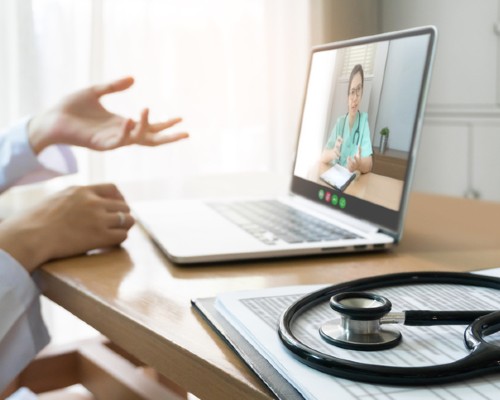Online GP consultations have unintended consequences that may put some patients at a disadvantage and create additional work for GP practice staff, a National Institute for Health Research (NIHR)-funded study at the University of Bristol has shown. The DECODE study, published in the British Journal of General Practice, examined the use of online consultations in primary care to improve how they will be used in the future.
NHS England required all GP practices to offer online consultations – where patients submit their symptoms via an online form – by April 2020. Online consultations were promoted as a solution to improve patient access to primary care and reduce GP practice workload.
The researchers, based at the NIHR Applied Research Collaboration West (ARC West) and the Centre for Academic Primary Care (CAPC), University of Bristol, interviewed 19 staff and 21 patients who used online consultation tools, across eight GP practices in the south west and north west. These interviews took place in 2019, before the COVID-19 pandemic.
They found that for some patients, online consultations improved access to care and were convenient. This was particularly the case for patients who felt they could express themselves better in writing. Some patients valued submitting enquiries online at a time that suited them and for simple enquiries that didn’t warrant a face-to-face appointment.
However, online consultations made it difficult for some patients to communicate effectively with a GP. The structured questionnaires used in some systems were hard work for simple enquiries. When patients were allowed to write freely, some struggled to explain their issue. Patients weren’t sure if they were writing to their own GP or someone else and had concerns of who would read their enquiry.
To ensure patients with limited IT access or skills could still access care, some practices allowed staff to complete an online consultation form for them, over the phone or in person. However, this was time consuming for staff and could compromise patient confidentiality.
For some GPs, online consultations were valued for giving greater flexibility in managing patient care and staff working patterns. However, for others online consultations generated additional work and led to staff dissatisfaction. Poor quality or incomplete information meant patients needed to be followed up with a telephone or face-to-face consultation, which could duplicate work. Some GPs felt that spending more time in front of a computer processing enquiries resulted in ‘call-centre medicine’ which was tiring and isolating, and meant less time physically seeing patients.
Dr Andrew Turner from NIHR ARC West and the University’s Centre for Academic Primary Care, and a lead author of the study, said: “In many cases the unintended consequences we identified were often the result of how the online consultations were implemented, rather than just a consequence of the technologies themselves. This means some negative consequences can be avoided if they are recognised in advance and solutions are sufficiently resourced.”
Professor Jeremy Horwood from NIHR ARC West and the University’s Centre for Academic Primary Care, added: “The roll-out of these systems has accelerated during the COVID-19 pandemic. Along with our previous work in this area, this research shows that it is critical to get the implementation of digital health technologies right. Primary care is already facing a workforce crisis and greater demand from patients. Technology should be helping rather than hindering access to care and GP workload.”
The DECODE team have produced guidance outlining the unintended consequences they identified and their mitigation for clinicians and practice managers.
Paper
‘Unintended consequences of online consultations: a qualitative study in UK primary care’ by Andrew Turner et al in British Journal of General Practice
Further information
About the National Institute for Health Research
The mission of the National Institute for Health Research (NIHR) is to improve the health and wealth of the nation through research. We do this by:
Funding high quality, timely research that benefits the NHS, public health and social care;
Investing in world-class expertise, facilities and a skilled delivery workforce to translate discoveries into improved treatments and services;
Partnering with patients, service users, carers and communities, improving the relevance, quality and impact of our research;
Attracting, training and supporting the best researchers to tackle complex health and social care challenges;
Collaborating with other public funders, charities and industry to help shape a cohesive and globally competitive research system;
Funding applied global health research and training to meet the needs of the poorest people in low and middle income countries.
NIHR is funded by the Department of Health and Social Care. Its work in low and middle income countries is principally funded through UK Aid from the UK government.
About the NIHR Applied Research Collaboration West
The NIHR Applied Research Collaboration West (ARC West) conducts applied health research with its partners and others in the health and care sector, alongside patients and members of the public. Applied health research aims to address the immediate issues facing the health and social care system. ARC West also helps bring research evidence into practice and provides training for the local workforce.
About the Centre for Academic Primary Care, University of Bristol
The Centre for Academic Primary Care (CAPC) at the University of Bristol is a leading centre for primary care research in the UK, one of nine forming the NIHR School for Primary Care Research. It sits within Bristol Medical School, an internationally recognised centre of excellence for population health research and teaching. Follow us on Twitter: @capcbristol

